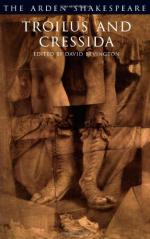|
This section contains 5,131 words (approx. 18 pages at 300 words per page) |

|
SOURCE: "'Monsters in Love's Train': Euripides and Shakespeare's Troilus and Cressida," in Comparative Drama, Vol. 18, No. 1, Spring, 1984, pp. 38-53.
In the following essay, first presented at the annual meeting of the Shakespeare Association of America in 1982, Arnold compares the structure and characters in Troilus and Cressida with those found in several of Euripides' plays.
The Trojan War, fought for a trivial cause, setting "kindred" speakers of the same language and worshippers of the same gods against each other, has provided a dramatic image of bitter, needless suffering to authors as widely separate in time as Euripides, Shakespeare, and Giraudoux. In the sixteenth century, further, another conflict of kindred, the mutual slaughter of Oedipus' surviving sons Eteocles and Polyneices in Aeschylus' Septem and Euripides' Phoenissae made the same point. Of the Greek tragedians Euripides turned most frequently to these conflicts, illustrating the effects of suffering on the central characters...
|
This section contains 5,131 words (approx. 18 pages at 300 words per page) |

|


